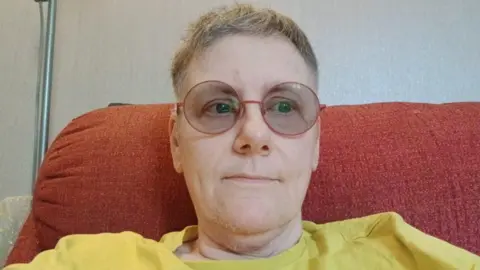Pip claimants relieved but fearful after PM's U-turn
 SUPPLIED
SUPPLIEDSharon Arrowsmith, a Labour voter all her life, says she never thought she would have to "fear" the party in government.
But she says the government's plans to change who qualifies for certain disability and sickness benefits had left her "terrified".
"I can't afford to lose a single penny", she says. "It's unconscionable."
But early on Friday, the government confirmed a U-turn on its cuts to disability benefits in a bid to avert rebellion by more than 120 Labour backbenchers - leaving Sharon, from Derbyshire, breathing "a huge sigh of relief".
The Universal Credit and Personal Independence Payment Bill was meant to tighten eligibility requirements for personal independence payments (pips), halve the health-related element of universal credit (UC), and increase the UC standard allowance.
The government hoped to save £5bn a year by 2030 with the bill, while slowing the increase in people claiming benefits.
It was the changes to who qualifies for pips in particular that caused deep unhappiness amongst MPs.
Now pip claimants will continue to receive what they currently get, as will recipients of the health element of universal credit. Planned cuts will only hit future claimants.
As well as changing who will be affected by the cuts, ministers are also expected to fast-track a £1bn support plan originally scheduled for 2029.
However many charities have rejected the concessions.
Dr Amo Raju, from the Derby-based charity Disability Direct, says the legislation should still be pulled.
"Welfare reform does need to happen, but it needs to involve disabled people in that decision-making process," he said.
"Let's pull it, get the right individuals around the table and co-produce the policy in the interests of disabled people."
'There's no fun'
Ms Arrowsmith, from Amber Valley, has fibromyalgia, meaning she has difficulty moving about. It causes her chronic fatigue and joint and muscle pain. She struggles to do housework and shopping and often struggles to physically get out of bed.
The 55-year-old also has other conditions including diabetes type 2, underactive thyroid, and growing cataracts which means she cannot drive and is reliant on others.
An autism diagnosis leaves her struggling with impairment of executive function and staying on task.
She had to stop working in January due to these conditions, and receives the mobility element of -ip, which is about £400 a month.
She also receives universal credit, the vast majority of which is spent on private rent payments and bills.
The pip payment used to help her employ someone to help with house tasks, but due to rising costs she says she is now heavily reliant on it to afford food after being left unable to work.
"I can't afford to lose a single penny. I would no longer be able to buy food or pay rent," she said.
"I have already cut everything down to the bone. There is no excess. There is no fun."
Sharon thought she was likely to lose out because she will not score enough points in certain areas, like being able to wash and dress, which she can mostly manage.
The government had been proposing that from November 2026, pip claimants would need to score at least four points from a single pip daily living activity to qualify for the daily living component of pip, as well as scoring a total of at least eight points.
Sharon says she is relieved by the climbdown.
"I'm so proud of [the rebel MPs] for doing that, at the risk of their careers, having the courage to stand up. They are the real Labour people," she says.
However, she says she worries for new claimants who will be impacted in the future.
"I am concerned still, I still think they really need to look at this bill and think about the people. Not the money, the people, that's what's important.
"I feel like I was wrong to vote Labour."
 SUPPLIED
SUPPLIEDGordon Patten, from Long Eaton, is in his early fifties and is unable to work because of sarcoidosis, a rare condition impacting the lungs that means he must sleep with a machine aid.
He also has been diagnosed with depression and type 2 diabetes and has had epilepsy since he was a child.
Gordon receives roughly £460 a month through the daily living component of pip, which helps towards expenses such as the electricity bill his breathing aid machine leaves him with, which he says has increased, and hiring a cleaner to help with housework.
He also receives the standard rate for mobility and is entitled to a mobility vehicle, an element which the government says will not be impacted by the changes.
Gordon says he was glad to see the Labour backbenchers who disagree with the policy "standing up" to the prime minister.
"It is going to be a two-tier situation but we've had this in the past with disability allowance. You're always gonna have that, where people who started on a benefit get more," he said.
But he says the Labour Party have "mucked this up completely" for people like him.
"If you go back to 1945, at the beginning of the welfare state, it was a core [Labour] value
"Labour has kind of lost its way with looking after the working person and the vulnerable...I honestly think that being in power has gone to their heads."
A Department for Work and Pensions spokesperson said: "Ministers have repeatedly recognised how anxious people are when there is talk of reform which is why we will never compromise on protecting people who need our support.
"Our reforms will mean the social security system will always be there for those who will never be able to work."
Follow BBC Derby on Facebook, on X, or on Instagram. Send your story ideas to [email protected] or via WhatsApp on 0808 100 2210.
